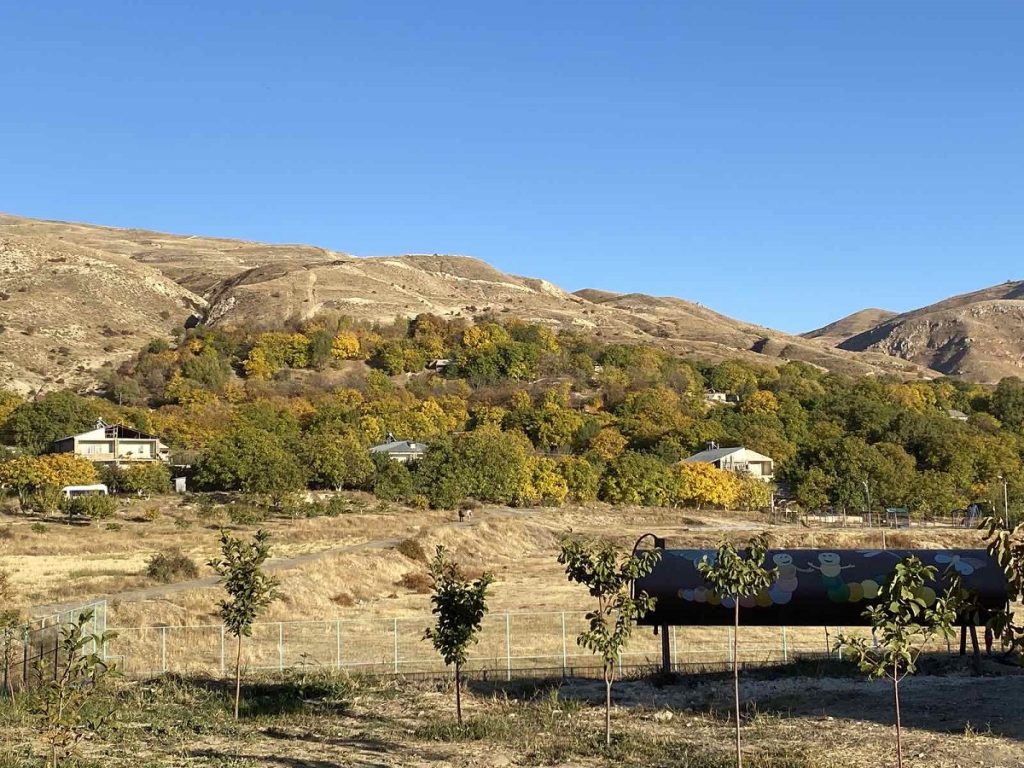'Azerbaijani villages are closer than ours' - Armenian border village of Khachik
The Armenian village of Khachik is located on the border with Azerbaijan. From three sides (from the south, west and southeast) it cuts like a wedge into the territory of Nakhichevan, Azerbaijan’s exclave. The village has 27 kilometers of the state border with Nakhichevan.
“If the Armenian village of Areni is at a distance of 21 kilometers from us, then the nearest Azerbaijani village is only four to five kilometers away. After the second Karabakh war, anxiety increased in the village. People became more anxious. Before they felt more confident when they were in the status of “winner”, now they are more wary. We have no right to leave the village, the border should not weaken”, says Kajik Khachatryan, director of the local school.
The village is located 130 kilometers from Yerevan, 700 people live here. During the 44-day war in 2020, there was no fighting here, but for safety reasons, the children were evacuated from the village.
Local residents tell about the life in the village of Khachik lives after the war.
- Mentoring schools in Armenia: helping remote and borderline villages
- Armenia facing critical depopulation: selective abortions, war, and Covid-19 pandemic
- Residents of South Armenia hope for tourism renaissance in the aftermath of second Karabakh war
Children’s safety
The local school has 86 students and is located directly opposite the posts of the Azerbaijani armed forces.
“Every second we are responsible for the safety of children, they are almost at gunpoint here. This situation has a heavy impact on their psyche. Just imagine: children can see the movement at Azerbaijani posts even when they are sitting in class”, says the school director.
Armine Petrosyan has three daughters and she regrets that her children are going through the same stress that she went through in her childhood:
“In the 90s, when I was the same age as my youngest daughter is now, I survived the war in Khachik. Now she has to go through it – the same situation, another war. Although during the war we evacuated them from the village. They didn’t hear shots like we did, but they are still stressed. I would like them to avoid the experiences that I had then. They understand everything, my five-year-old daughter is following the development of events on TV and asks a bunch of questions”.
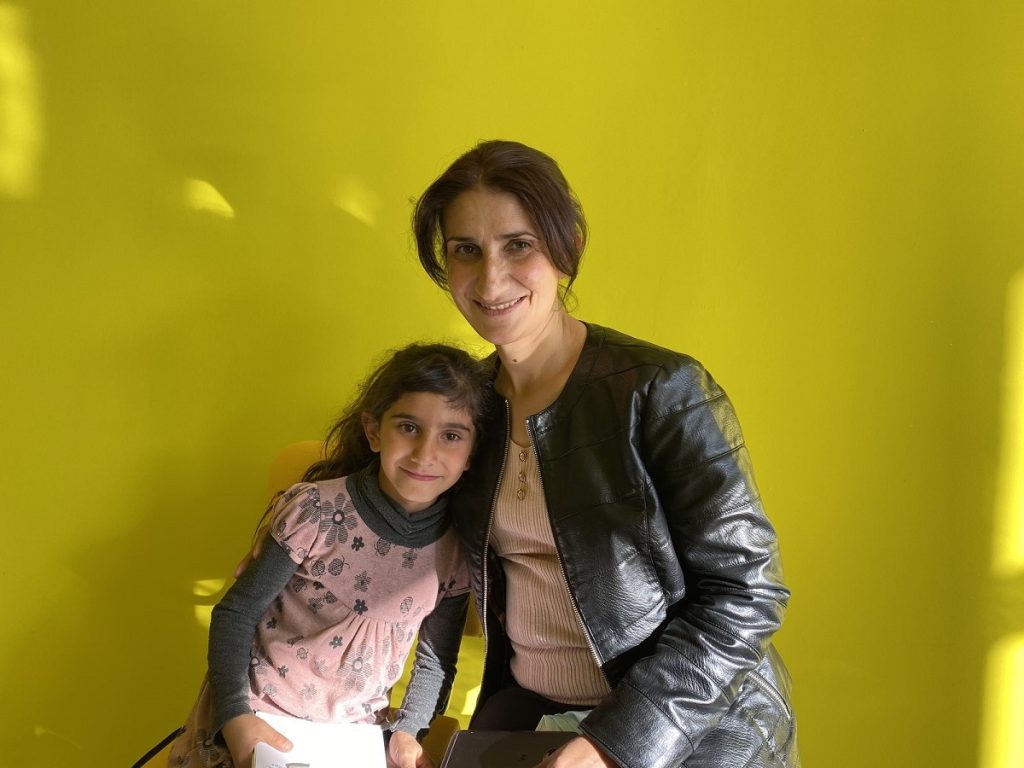
Armine teaches physics and mathematics at school, her husband is a contract soldier who is now serving in the local military unit.
“This is our home, we live and work here. Naturally, we are worried, the border itself forces us to be on the alert, and the factor of children exacerbates the feeling of anxiety”, says Armine.
The neighbors are too close
The arable land and gardens of Khachik are located right in the middle between the Armenian and Azerbaijani posts.
“We live and do not know what will happen to us. I’m going to pick apples and I don’t know if I’ll come back. When we pick apples, we can even smell their dinner, they make tea, talk, we hear their voices. But we will plow and sow. Because if we miss a year, then we will no longer dare to enter the gardens. Our tractor is plowing right at the border, the harvester is harvesting. We go to bed, and from our window you can see the sparkling lights of Nakhichevan”, says Khachik resident Sona Makaryan.
She teaches the carpet wavering to the children of Khachik and neighboring villages.
Sona says that during the Soviet years, residents of Khachik traveled to the capital of Armenia through Nakhichevan:
“We drove to Yerevan through the village of Khadzhi, immediately went to Yeraskh, so the trip was significantly shorter”.
Times were different, and so were the relationships. Now a resident of Khachik Seda Grigoryan says it’s unpleasant when you constantly feel someone’s gaze, control:
“You work in the field – they are watching, but we seem to have got used to it. I don’t think the kids are very scared. We have a military unit, we have a good spiritual community, a school, children grow up under the influence of this trinity. One of them has a brother in a military unit, another has a father, an uncle, and the children grow up in this atmosphere”.
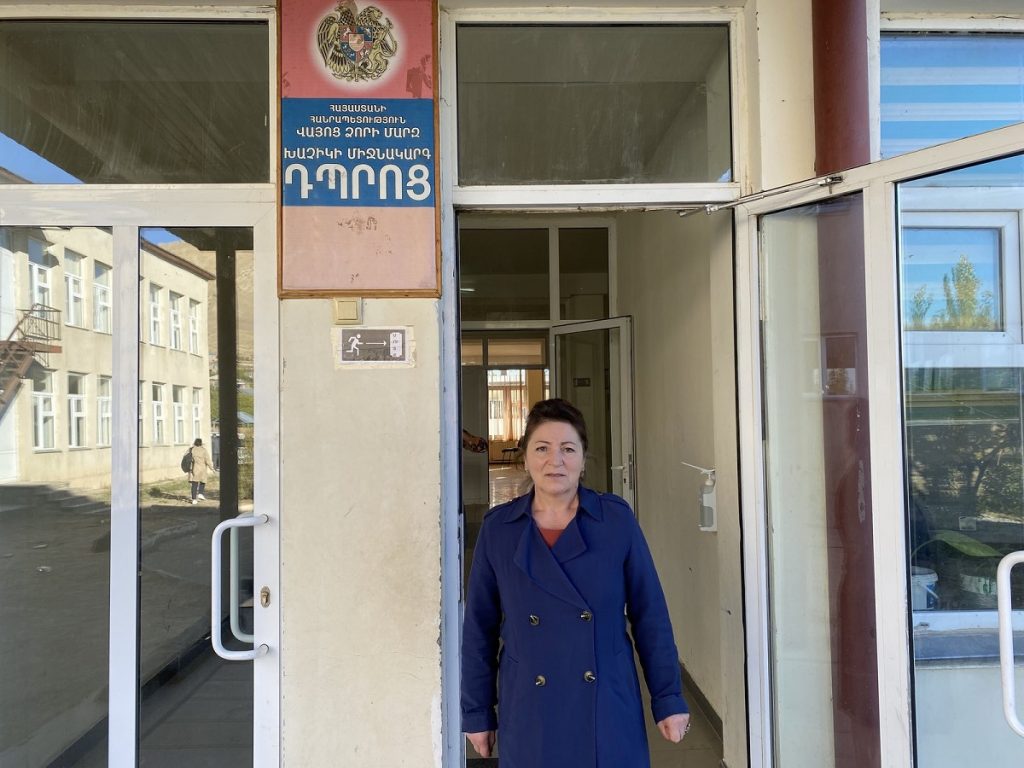
“There is everything except money”
Sona Markosyan is proud that her ancestors who settled in Khachik in the 5th century. Seda Grigoryan says that many families here have been living here for centuries:
“We are called old Armenians, like the inhabitants of the village of Areni. And new Armenians also live here, those who moved here in the 1800s from Bayazet, that is, Western Armenia [a city on the territory of Turkey], and Khoya [a city on the territory of Iran]. I compare us with those endemic plant species that endure rain, sun and wind, they are obliged to grow and grow“.
Sona says the locals are hospitable and very hardworking:
“We make everything, but we have no money. Our cellars are full, but we cannot sell our products. The market is far away, and people rarely reach our village. Therefore, we send the guests home with everything that is in the cellars. We have everything except money. And we cannot go to the dentist or the ophthalmologist – we have nothing to pay them with”.
Seda Grigoryan adds that in the fall, during the harvest season, they do not know where to store the grapes and apples:
“It would be nice if some kind of processing shop, drying houses for the preparation of dried fruits were opened in the village. Women would have a job and the issue of selling products would be resolved”.
In Khachik they are mainly engaged in gardening and animal husbandry. In recent years, a sewing workshop has opened here, where several women have found jobs.
Why young people don’t get married
The number of students in the school is gradually decreasing, but the problem is not with young people leaving, says school director Kajik Khachatryan:
“We have more than 70 young guys who do not marry because of the housing issue. They have a job, they do not leave the village, but they also don’t get married. Some of the houses in the village are old clay buildings, some are new buildings, but the house construction program has been suspended. While it is impossible to build a house here using their own funds, the Khachik residents do not have that kind of money”, explains the school director.
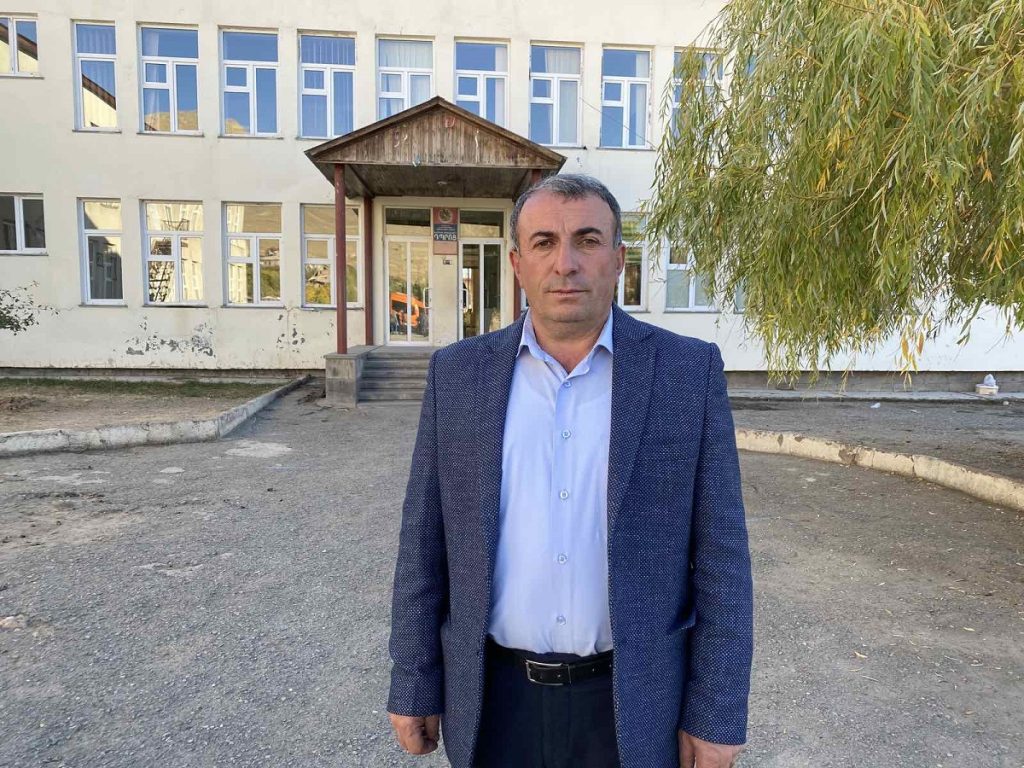
According to Kajik Khachatryan, the state once found the right solution to preserve the village:
“In 2014-2018, the state allocated a certain amount for building materials, the rest we took upon ourselves. It was a gratuitous amount, and the labor force came from the village. Several houses were built, and after the change of government [the Velvet revolution of 2018], the program was suspended. We hope that this program will be restored”.
Girls playing soccer
Right on the border, not far from the military positions, teenage girls play football. They are all fans of the famous Armenian football player Henrikh Mkhitaryan.
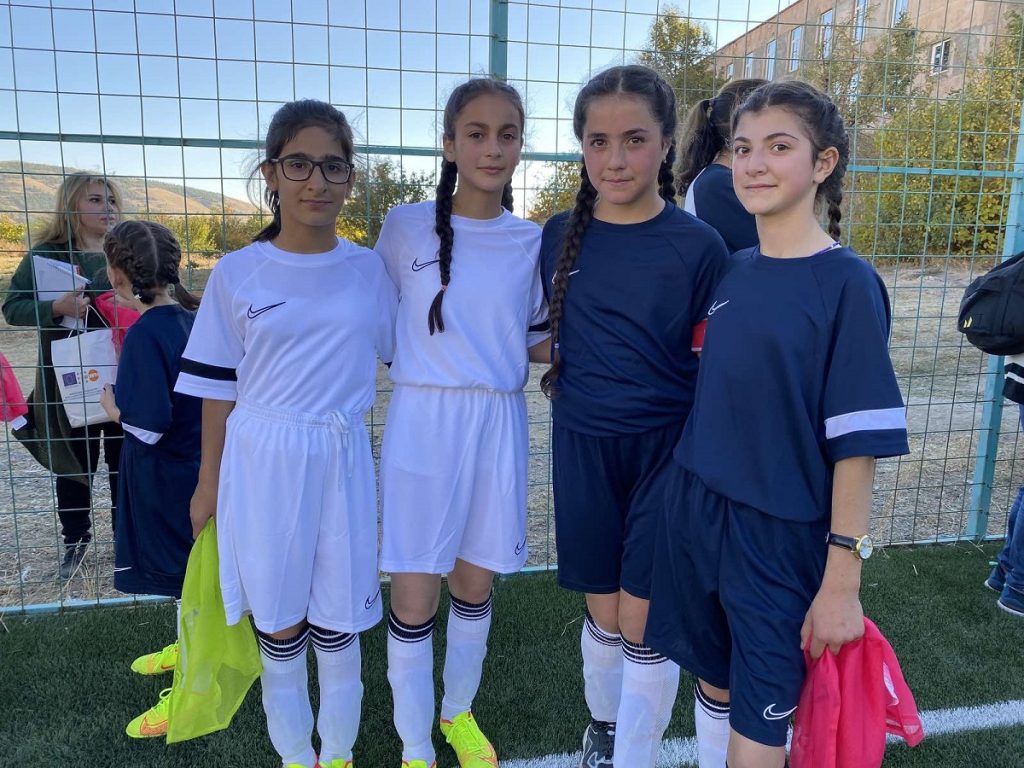
“Surprisingly, we did it. There are 12 of us, we are actively training and intend to develop further”, says one of the players, Sona Ohanyan.
The team was created by school PE teacher Garik Ghazaryan:
“Girls have strong-willed qualities, guys are not like that, with girls it is easier. Team members are 12-14 years old. Football is a men’s game, but girls also participate in world football competitions, and women’s football is developing in Armenia”, the coach says.
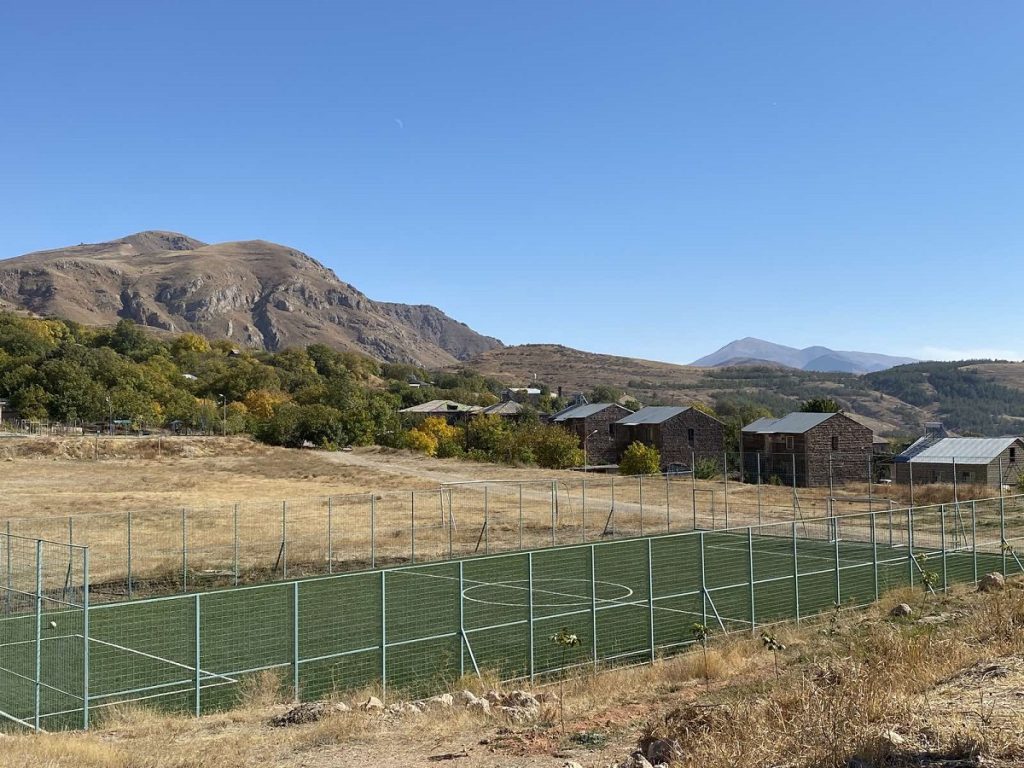
For three months already, Garik Ghazaryan has been working on a newly opened branch of the Art of Survival organization in the village. Its goal is to teach the people of Armenia to defend themselves in a war.
“Khachik is a village of strategic importance, here everyone, including children, must own a weapon, know the rules of strategy and tactics. We train twice a week. Imagine, even if not for show, but inside yourself, every evening you worry that you go to bed in the immediate vicinity of the posts of the country that is at war with yours.
We have such a problem, but we have no way to break it. If one of us breaks down, especially one of those responsible for some structure in the village, this disappointment will affect several dozen families. Therefore, we must be strong and resilient”, says the headmaster, Kajik Khachatryan.
